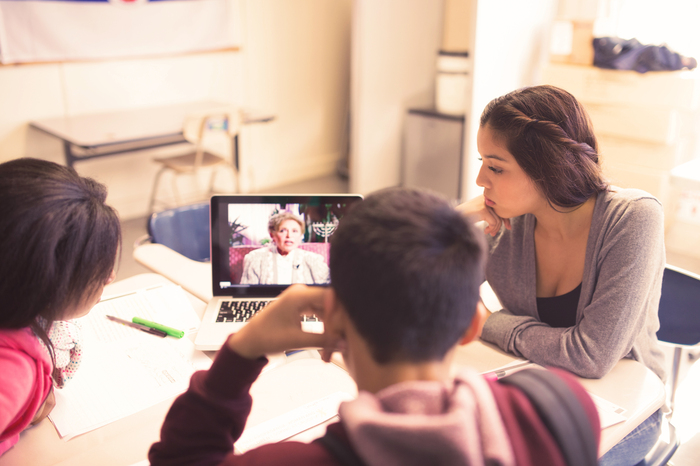
LITERATURE
TEACHING

Since 2009, I have been using Echoes and Reflections as an essential resource with English/language arts and history/social studies teachers to help their students understand the literature (fiction and non-fiction) of the Holocaust. Using the well-crafted lessons, powerful visual testimonies, and carefully selected primary documents in Echoes and Reflections, I help teachers learn compelling content and effective strategies that deepen students’ engagement and analysis of Holocaust literary and historical texts. By integrating these texts into Echoes and Reflections, teachers and students personalize the history of the Holocaust; reflect on the role of individual responsibility, and learn to act on behalf of social justice for all.
A lesson that I have found to be particularly effective is a lesson that I developed for use with in-service and preservice teachers using Lesson 4: The Ghettos and We Are Witnesses: Five Diaries of Teenagers Who Died in the Holocaust (Jacob Boas, Scholastic, 1995).
Below is an outline of the lesson “Integrating Holocaust Non-fiction into Echoes and Reflections.”
- Write the word “ghetto” on the board and ask students to write their images and thoughts about the word in a journal.
- Introduce Ellis Lewin and Joseph Morton to the group using their Biographical Profiles and then show their testimonies from Lesson 4. Have students compare their original images and thoughts about the word “ghetto” to what they learned from these survivors.
- Distribute primary source materials in Echoes and Reflections to enhance students’ understanding of the ghettos.
- After an introduction to the teenagers in We Are Witnesses, have students divide into groups by teenage author and then read about their chosen teenager as a group.
- Initiate a jigsaw exercise, asking students to move into new groups with at least one representative from each diary. Have students discuss their teenagers and perceptions of life in the ghettos.
- Share testimony from additional survivors featured in Lesson 4: Leo Berkenwald, Milton Belfer, George Shainfarber, and Eva Safferman to provide students with additional perspectives of ghetto life.
- Ask students to consider what they learned about the ghettos from the diary entries and visual history testimonies shown in class using the following questions to guide the discussion:
- What did the young people you learned about do to survive in the ghettos?
- How did the people you read about or listened to maintain hope?
Lesson 4: The Ghettos addresses Common Core State Standards and the NCTE/IRA Standards for the English Language Arts with its focus on citing textual evidence, analyzing multiple mediums, and referencing texts.
Beverly Ann Chin is Professor of English, Director of the English Teaching Program, and former Director of the Montana Writing Project at the University of Montana in Missoula.




This site contains links to other sites. Echoes & Reflections is not responsible for the privacy practices or the content of such Web sites. This privacy statement applies solely to information collected by echoesandreflections.org.
We do not use this tool to collect or store your personal information, and it cannot be used to identify who you are. You can use the Google Analytics Opt-Out Browser Add-on to disable tracking by Google Analytics.
We currently do not use technology that responds to do-not-track signals from your browser.
Users may opt-out of receiving future mailings; see the choice/opt-out section below.
We use an outside shipping company to ship orders. These companies are contractually prohibited from retaining, sharing, storing or using personally identifiable information for any secondary purposes.
We may partner with third parties to provide specific services. When a user signs up for these services, we will share names, or other contact information that is necessary for the third party to provide these services.
These parties are contractually prohibited from using personally identifiable information except for the purpose of providing these services.
1. You can unsubscribe or change your e-mail preferences online by following the link at the bottom of any e-mail you receive from Echoes & Reflections via HubSpot.
2. You can notify us by email at info@echoesandreflections.org of your desire to be removed from our e-mail list or contributor mailing list.




